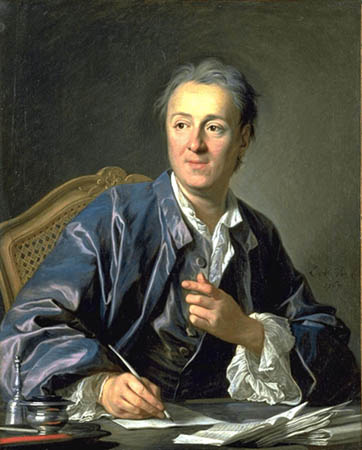“There are things I can’t force. I must adjust. There are times when the greatest change needed is a change of my viewpoint.” – Denis Diderot
Humanities scholars tend to dismiss the Enlightenment, the period of time in Western thought that produced the American and French Constitutions and the Scientific method. In fact, my alma mater, Virginia Tech, offered literature courses in every possible culture and era except the Enlightenment. Dr. James Schmidt argues in his lecture series Making Man in Reason’s Image, The Enlightenment and the Birth of Modern Humanity that scholars characterize the Enlightenment as somewhat frivolous, just a bunch intellectuals hanging out in coffee shops and waxing philosophical.
I have an alternative hypothesis. Humanities scholars disparage the Enlightenment for imposing reason on their poetical frivolity. Intellectuals like Thomas Paine, philosophical father of the American Revolution, and John Locke, who wrote the bible of Empirical thought, freed humanity from the chains of tradition during the Enlightenment, but the Humanities tend to regard them as imposing the chains of reality on their creativity.
Denis Diderot was also one of the powerful minds of this age. Diderot oversaw the writing of a comprehensive set of encyclopedias, to which the church and monarchy worked every legal means against him to prevent the publication of each volume. Diderot contributed over 1,000 articles to the 17-volume set, which took 14 years to produce.
There are powerfully forward-thinking concepts in Diderot’s philosophical writings. At the time of his life, 1713 – 1784, Descartes’ Cartesian Duality, the idea that the mind and physical body were separate and distinct entities, was the popular notion. It was a philosophical argument for the existence of a soul. We have to have an immaterial soul, the argument goes, because matter alone cannot be imbued with conscious thought.
In his philosophical dialogue D’Alembert’s Dream, Diderot explained how stones may come to think. If you take stones, grind them up, mix them with compost, grow plants with the compost, and then eat the plants, you have produced thinking stones. It is not that conscious and unconscious matter are distinct realms of being, but rather that consciousness is a characteristic of certain configurations of matter.
Diderot proposed that all matter was in a state of constant flux, that even species on Earth were perpetually changing. Extending from this idea, Diderot proposed that we might invent machines with consciousness. He used the clavier musical instrument as an example, suggesting that with consciousness, claviers could play themselves. If sufficiently complex, claviers could feed themselves and produce offspring. As outrageous as this idea sounded centuries ago, today we work with intelligent machines, where the current generation of processing chips is responsible for designing the next generation of processing chips.
While the Cartesian Duality provided a simplistic way of understanding the Universe, where we conscious beings are special and distinct from nature, Diderot’s understanding makes no such distinction. We are irreducibly intertwined with nature, a swarm of atoms that produces consciousness, but nature, in the form of a blow to the head, turns off our awareness and any perception of our distinction from inanimate matter.
If all of the cells in our bodies are replaced regularly, then what is the common thread that defines who we are? In his philosophy, it was conscious memory. Today, we know that we really don’t have even that much to define our uniqueness.
Diderot died on this day 325 years ago, and as we know through modern science, his atoms dispersed, some becoming air, others consumed by bacteria, others consumed by trees. We are breathing atoms that once belonged to Diderot, just as we are breathing atoms that belonged to dinosaurs, or were forged in the interiors of stars gone supernova billions of years ago. Our irreducible parts are one with nature and the Cosmos, and that is a more inspiring understanding of our place in the Universe than the idea that we are separate and isolated from it.


